
Ordinary smartphone cameras are capable of accurately determining the hydration severity of dengue patients to determine care and management by analyzing the color of their urine samples, says a new study.
Lucy Lum, an author of the study and professor of pediatrics at the University of Malaya, says that maintaining the right fluid balance is a major issue in dengue cases and it would be helpful if patients can just send pictures of their urine samples for diagnosis.
Annually, the world sees some 400 million dengue infections, of which a small proportion develops severe symptoms on day four or five of illness. Suspected dengue cases are followed up for daily assessment with the passage of dark-colored urine regarded as an indicator of dehydration.
In the study, published this month in PLOS Neglected Tropical Diseases, images of urine samples from 97 patients aged 13—60 years, taken with a standard mobile phone but in a customized booth to eliminate ambient light and other factors, were processed using Adobe Photoshop to index urine color into the red, green, and blue (RGB) color bands. The RGB values were found to correlate with patients’ clinical and laboratory hydration indices.
Abdul Muhaimin Azhar, co-author of the study and lecturer in medicine at the University of Malaya, says that any ordinary phone camera will work. “The essential smartphone feature that we used in our study is the ability of the complementary metal-oxide semiconductor (CMOS) sensor to convert color images into digital components with RGB values,” he tells SciDev.Net. “CMOS sensors are ubiquitous in digital cameras, such as those in smartphones.”
As a point-of-care tool, a smartphone equipped with a downloadable application can be linked to physicians in tertiary care centers, the study said. Adequate fluid intake at home could significantly reduce the risk of hospitalization and reduce the economic impact of dengue in countries experiencing dengue epidemics.
Given the ready availability of smartphones even in difficult-to-access rural areas, a hydration tracker application can be a valuable tool for both patients and medical personnel, the authors say.
Leo Yee Sin, executive director of the National Center for Infectious Diseases, Singapore, tells SciDev.Net that there are hurdles in the actual deployment of the tool. “First of all, users need to be provided with the standardized photo-booth, as well as be taught the utilization of apps in mobile phones and how to link up to the healthcare system etc.”
The authors also acknowledge several limitations to the study, including the fact that the effect of diet and medications on urine color were not controlled for.
Source: Read Full Article